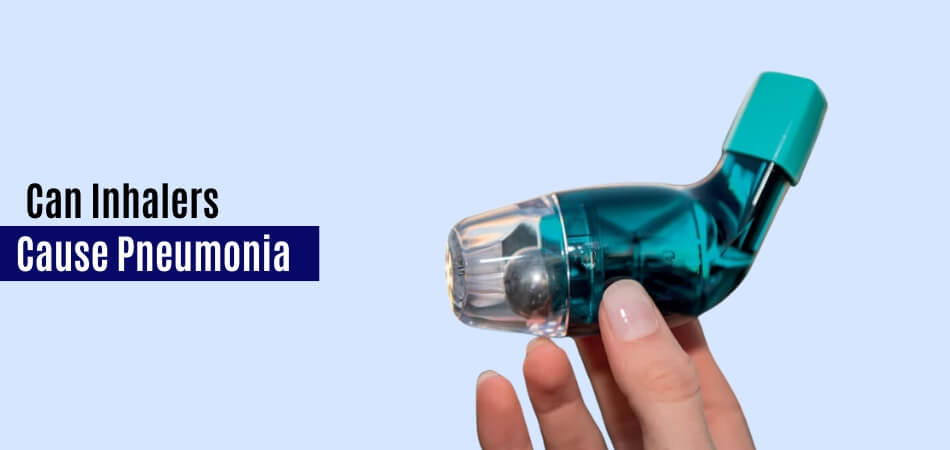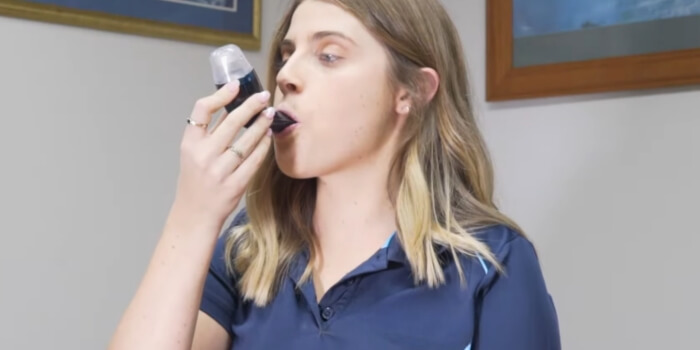Pneumonia isn't just a word that sends a chill down your spine; it's a serious health concern that can have a major impact on your life, especially if you're dealing with chronic conditions like COPD.
As far as managing these conditions is concerned, inhalers are often the first line of defense. These handy devices deliver medication directly to your lungs, offering relief and better breathing.
However, there is something you might find interesting that might catch your attention: Can inhalers cause pneumonia?
The evidence points towards the possibility that this might be the case, particularly with long-term use of inhaled corticosteroids, linking them to an increased risk.
It's crucial because pneumonia isn't just an unpleasant cough; severe health problems can result, including impaired lung function.
Curious to dive deeper into this? Stay tuned as we unpack the details in the rest of our discussion.
Inhalers' Objectives
Inhalers are the spotlight when managing respiratory conditions like asthma or COPD. Think of them as your personal, pocket-sized breath of fresh air.

They're designed to do a few crucial things. First off, they deliver medication right where it's needed most: your lungs. This direct route means the medicine works faster and more efficiently, easing symptoms like wheezing, coughing, and shortness of breath in a snap.
Inhalers come in different types, with some providing quick relief during an asthma attack. Others work more like marathon runners, offering long-term control to keep symptoms at bay.
Their objective? To breathe easier, live more comfortably, and reduce respiratory flare-ups. It's all about giving you the freedom to enjoy life without your condition constantly looming over you.
So, to cut it short, inhalers are untold heroes in the lives of anybody who needs to manage respiratory conditions.
Do Inhalers Possess Risks?
Yes, while inhalers are a game-changer for many, they come with their risks. Like any medical treatment, they're not a one-size-fits-all solution and need to be used correctly under medical guidance.
Side Effects
The first thing to consider is the side effects. Depending on the type of inhaler and the medication it delivers, you might experience anything from mild throat irritation to more serious issues like voice changes or a thrush.
It's all about balance here; the benefits usually outweigh these discomforts, but it's something to watch.
Long-Term Risks
Then there's the long haul to consider. With chronic use, especially of inhaled corticosteroids, pneumonia risk increases.
This is especially true for folks with conditions like COPD, where pneumonia can ruin symptoms and overall health.
Inhalers are a critical tool for many, offering much-needed relief and control over respiratory conditions. However, staying informed about potential risks and working closely with your healthcare provider is key to making the most of this treatment. In addition, you should keep an eye on your overall lung health.
Is it Important to Know the Risks Associated with Inhalers?
Yes, absolutely. Understanding the risks associated with inhalers is just as crucial as appreciating their benefits. It's about making informed health decisions.
Side Effects Awareness
Knowing about possible side effects, from the mild to the serious, allows you to spot issues early and address them. Whether it's dry mouth or something more concerning like signs of an allergic reaction, being in the know helps you manage your health proactively.
Long-term Use Considerations
Long-term implications of inhalers, especially steroids, shouldn't be overlooked. Awareness of potential risks like increased chances of pneumonia or bone density loss is vital.
This knowledge enables you to discuss preventive measures with your doctor, like calcium supplements or regular bone density scans.
Balancing Act
Weighing the pros and cons of inhaler use is easier with knowledge. It's a balancing act between managing your immediate symptoms and considering the long-term impact on your health.
Being informed means you can work closely with your healthcare provider to tailor your treatment plan for optimal health and well-being.
Having a clear understanding of the risks allows you to take control of your treatment, which will result in you breathing easier and living a healthier life.
Can Inhalers Cause Pneumonia?
When managing respiratory conditions, inhalers are often the heroes of the hour, offering quick relief and long-term control. But, like every hero story, there's a twist.

One question that often arises is: Can inhalers cause pneumonia or can they help treat it?
Based on current research, this is most likely true, particularly with the chronic use of inhaled corticosteroids. This potential side effect adds a layer of complexity to the decision to use inhalers, especially for those with conditions like COPD, where the stakes are high.
Let's dive deeper into the factors at play.
The Role of Inhaled Corticosteroids
Inhaled corticosteroids are the cornerstone in managing chronic respiratory conditions. They reduce inflammation and prevent flare ups. However, their very mechanism suppressing the immune response in the lungs can make the lungs more susceptible to infections, including pneumonia.
Impact on the Immune System
The immune system is our body's defense mechanism against infections. Corticosteroids, by design, dampen this response to control inflammation.
This suppression, particularly in the lungs, can create an environment where bacteria or viruses can take hold, leading to an increased risk of pneumonia.
Dosage and Duration Matters
The risk of pneumonia varies across all inhaler users. It tends to be higher in those using high doses of inhaled corticosteroids over a long period.
The balancing act between managing asthma or COPD symptoms and minimizing risks requires careful navigation and regular review by healthcare professionals.
Individual Vulnerability
Not everyone's risk is the same. Factors like age, respiratory severity, smoking status, and overall health can influence how likely someone is to develop pneumonia from using an inhaler.
It underscores the importance of a personalized approach to treatment, where benefits and risks are weighed for each individual.
The use of inhalers, especially those containing corticosteroids, is valuable for managing respiratory conditions, but comes with risks, such as pneumonia.
However, vigilance and open dialogue with healthcare providers are needed. Managing these risks involves monitoring, adjusting doses, and considering lifestyle factors. As a result, inhaler use continues to be beneficial.
Can it be prevented?
Yes, it can be prevented. With the right strategies and vigilance, pneumonia risk can be minimized.
Good Hygiene Practices
You should always keep your inhaler clean so that it lasts as long as possible. Regular cleaning prevents bacteria buildup that leads to infections.
Regular Medical Check-ups
There is no substitute for frequent check-ups when it comes to living a healthy lifestyle. Your doctor can adjust your treatment plan to minimize the risks involved.
Proper Inhaler Technique
When you use your inhaler correctly, you ensure that the medication is delivered effectively to your lungs, which reduces the likelihood of complications occurring.
Vaccinations
As a rule, the best way to stay healthy is to get vaccinated, especially pneumonia and flu vaccines, which can prevent infections from spreading to your lungs, and thus help you stay healthy.
You can significantly reduce the risk of pneumonia associated with inhaler use by following these preventative measures. This will ensure that your lungs stay healthy.
What Measures Can You Take?
Navigating the world of inhalers and their potential risks might seem daunting, but fear not. With the right measures, you can protect your lungs and minimize risks.

Maintain Inhaler Hygiene
A clean inhaler is crucial. Regularly washing your device according to the manufacturer's instructions can ward off harmful bacteria and reduce infection risk.
Optimize Inhaler Technique
When you use your inhaler properly, you are maximizing the effectiveness of your medication and minimizing side effects. A healthcare professional can review your technique and offer improvement tips.
Regular Health Check-ups
Frequent visits to your doctor can help catch issues early. They can adjust your treatment plan as needed to ensure it's still the most appropriate fit for you.
Stay Vaccinated
Vaccinations, especially against pneumonia and the flu, are your friends. They add an extra layer of protection for your lungs against infections.
Devices like AirPhysio can benefit lung health. AirPhysio is designed to help clear mucus from the airways, which can improve lung function and reduce the risk of complications from respiratory conditions.
It's a non-invasive tool that uses oscillating positive expiratory pressure to aid in mucus clearance. This could complement your inhaler use by keeping your airways clear and reducing infections like pneumonia.
These measures ensure your respiratory health remains top-notch, rather than just reacting to risks.
FAQs
When managing chronic respiratory conditions, inhalers can present many challenges, especially when navigating the world of inhalers. It's crucial to separate fact from fiction to use these tools effectively and safely.
Let's dive into some frequently asked questions and shed light on common concerns.
Can Steroid Inhalers Damage the Lungs?
While steroid inhalers are a cornerstone in managing chronic respiratory conditions, long-term use carries risks, including an increased chance of pneumonia. However, it's imperative to note that this risk is a balance against the significant benefits they offer in controlling symptoms and preventing flare-ups.
Can Inhalers Cause Chest Infections?
Yes, pneumonia is a potential side effect of inhaled corticosteroids. If you're using these medications and show symptoms of a chest infection, consult your healthcare provider. They can determine if your inhaler contributes to the issue and adjust your treatment plan accordingly.
Can Inhalers Damage Your Lungs?
Direct damage to the lungs from steroid inhalers is unlikely. These medications deliver medicine directly to the lungs, minimizing systemic side effects. The key is using them as prescribed and under healthcare professional guidance.
Are There Ways to Reduce Pneumonia Risk with Inhaler Use?
Absolutely! Regularly cleaning your inhaler, practicing proper oral hygiene, staying up to date with vaccinations, and having frequent check-ups can mitigate the risk. Your doctor can also review your inhaler technique to ensure you're getting the full benefit without unnecessary risk.
How Can I Tell if My Inhaler Causes Side Effects?
Listen to your body. Common signs include oral thrush, hoarseness, or voice change. If you're experiencing unusual symptoms or respiratory symptoms worsen, it's crucial to discuss these changes with your doctor. They may suggest alternative treatments or adjustments to your current regimen.
The benefits of inhalers always outweigh the risks if you stay informed and in tune with your body.
Final Thought
We've been guided through the maze of concerns surrounding inhalers, especially the question, “Can inhalers cause pneumonia?” The answer, nuanced as it is, highlights the importance of being mindful of inhaled corticosteroids.
While these medications are effective in managing chronic respiratory conditions, they come with risks, including an increased likelihood of pneumonia.
But fear not, armed with the right practices such as regular inhaler cleaning, maintaining oral hygiene, and staying current with vaccinations, you can significantly reduce these risks.
Always remember, a well-informed user is a safer user. Keep these tips in mind, and you'll guide your health journey more confidently, ensuring smoother travels ahead.






